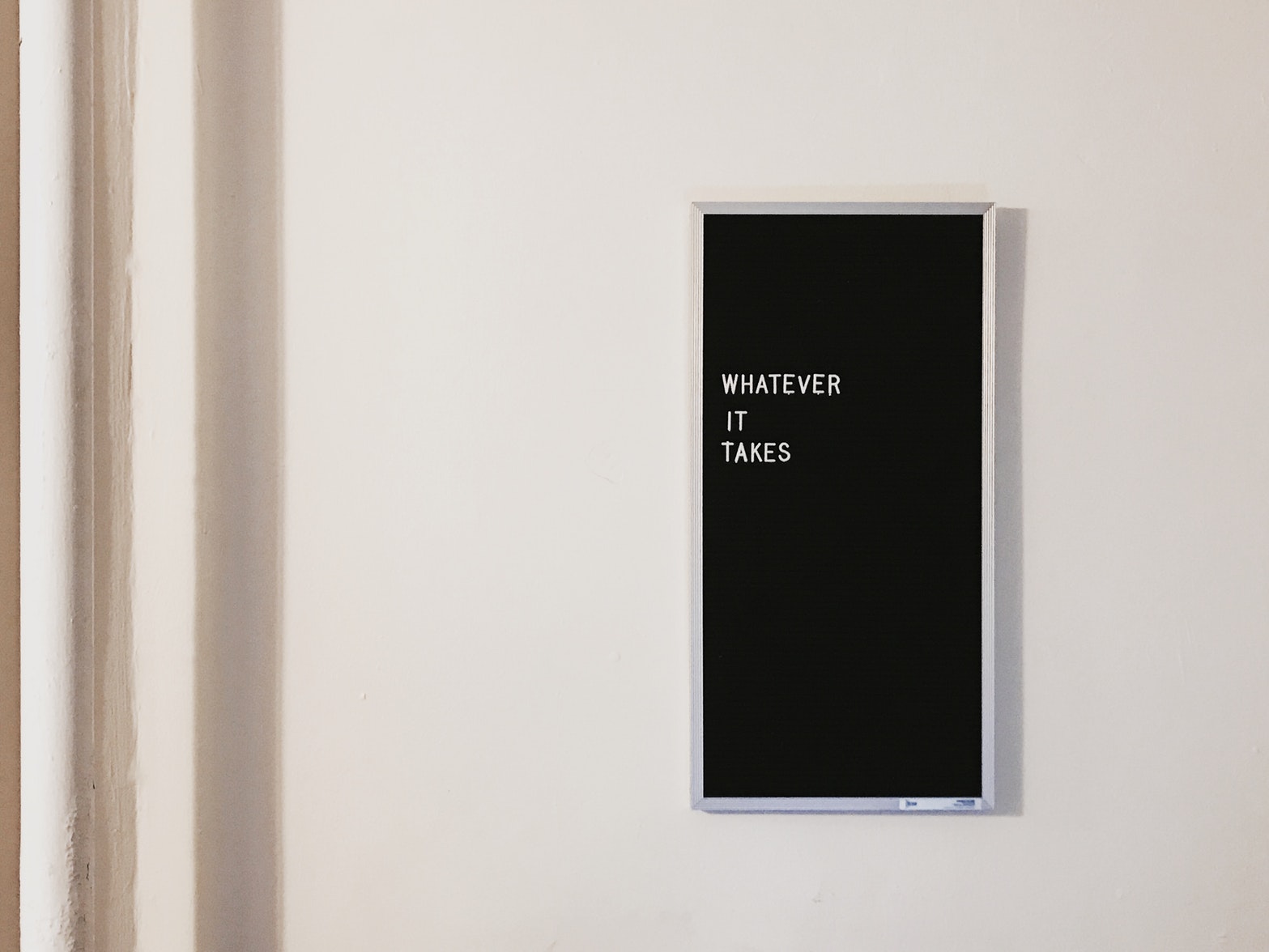So, I live with a fun combination of maladies who often compete to see who can give me the most dramatic brain-fog, and which can give me the murkiest, least-effective sense of motivation.
That overwhelming sensation of difficulty in crossing the threshold from “should do it” to “am doing it”? It’s also known as: executive dysfunction.
ExDys as I like to call it is a primary feature or symptom of many conditions.
I live with ADHD, C-PTSD and Hashimoto’s hypothyroidism. None of the tactics included in this piece are meant to address or solve the root causes of any of these conditions; they’re simply some tricks I’ve picked up over the past year which have allowed me to stick to a 3-5x/week gym-going habit.
1. Pair Your Tasks!
I used to forget my wireless headset often, and working out without headphones is awful. So I started hanging my keys on the same hook that my headset lives on! The charging cable loops from the outlet and also hangs on this hook, so when I arrive at home I take off my headset and plug it into the cable, thus freeing up the hook to hang my headset and keys on.
I also have to pack my gym bag every day. I applied pairing tasks here too! When I put my gym shoes in my bag, I have to take out my wet/sweaty gym clothes so they won’t mold. I put them in the hamper. My hamper lives next to my dresser, so moving over to pick out my outfit for the next day is pretty easy. Then I can put everything (outfit plus gym shoes) into the bag together.
And, so that I can’t forget gym clothes, I simply get dressed for the gym in the morning and just commute in my gym duds.
This took a lot of practice, and I still sometimes forget something (I’ve worn no panties several times because I forgot that part of “packing a work outfit”) but matching each task with another, necessary task (like hanging up my keys, or removing damp gym clothes so they don’t get nasty) has dramatically improved my adherence to accomplishment.
Extra tip: Pairing physical objects helps too! I am “not allowed” (in my brain) to tuck my phone away anywhere that doesn’t also have my wallet seated next to it. They are metaphysically attached. They go in the same pockets. They go in the same bag. Always.
2. Spend More Time Alone.
I am an introvert in an extrovert’s shell. I struggle a lot with codependency, and one of my major emotional projects is learning how to better maintain boundaries that I set for myself. Every week, I now schedule a few evenings to spend by myself (and I mean literally schedule: Put that shit in your Google Calendar!) and I refuse to cancel on myself like I would readily do to myself or to someone else when in a codependent relationship, or a relationship with poor boundaries.
The scarcity of time spent with others is primarily determined by you as independent actors. The same goes for the scarcity of time you spend alone. Of course there are Big Life Things that keep us from spending as much time with each other as we’d like, or as much time alone as we’d like; but I implore you to really look critically at how much of a scarcity-mindset we apply to thinking about how much time we spend with others, or spend with ourselves.
My newfound “free” time gives me so much more emotional space to work with. For the first few months, I loafed and watched TV and didn’t do a lot; and then I paired in a few more things like doing cross-stitch, gaming or reading really engaging novels. The more time I spent intentionally alone, not just “recovering” from life, relationships, work, whatever—the more capacity I found I had for remembering to pack things, prep things, and plan.
The idea of “time wasted” by yourself is mostly bullshit. Time doesn’t have to be spent in tangibly “productive” ways for it to refill your capacities. That’s some capitalist nonsense.
I found that, in time, I wasn’t just “recovering” or engaging in what we culturally think of as ritualized “self care”—I no longer was prioritizing anyone’s comfort, needs, or happiness above my daily preparations and rituals. It’s made it so easier to go to bed early enough to get up and go to the gym. Carving out that time and capacity has made it easier to also hold to that boundary even when being social—make it a habit for yourself, and it becomes easier to commit to when spending time with others.
I am still struggling with holding to regular social outings, hang-outs, and appointments, but I am hopeful and faithful in believing that my friends who truly care can see my habits for the self-work they represent; rather than perceiving these practices as abandonment, mindless self-absorption or a lack of care/interest.
3. Calendar Everything.
Google Calendar. So much Google Calendar. I literally put “GO TO THE GYM” on my calendar every single time I wanted to go for the first few months, just so it would pop up on my phone the night before. EVENTUALLY I got into the habit so that I didn’t need to any more, but I continued adding it for a few weeks longer.
Also, like I said before: Schedule in your alone time. It feels Bad (for me at least) to ignore an alert for a social event popping up on my phone, even when that Social Event is simply “SPEND TONIGHT ALONE.”
I also find it helpful to schedule chores, so that even if I don’t have the wherewithal to vacuum the living room tonight, I can schedule it for Thursday evening during my alone time. It honestly helps me get it done.
4. Negotiate Accountability With Others
My beloved Diana is the queen of friend-accountability in so many ways, and I am incredibly grateful for the check-ins and reminders that we’ve exchanged in helping to motivate each other to stay accountable to our goals. My friends and partners Corina, Darrel & Mark have also been helpful in this regard.
Pragmatically: what does this look like? It looks like inviting each other to work out together. Randomly messaging each other water/hydration reminders. Setting goals for the week and checking in with each other.
Put your reminders for your friends’ accountability check-ins in your Google Calendar. Don’t get hung up on if it’s on the “right” calendar, just stick it in at the time that you want to ping them. You’re not a bad friend for not automatically remembering the important thing you were going to do for your friends—sometimes you just need to use additional tools to make it happen. Accommodation is NOT personal failure.
If you go to psychotherapy: You can literally pay for someone else to help keep you accountable. If you have tangible goals like “go to the gym regularly”, tell them you want them to hold you to that! Yes, it might be a separate part of your life than many of the things you generally discuss with them, but a good therapist will generally hold you to the goals you set for yourself. That’s often part of their work for helping you with your psyche, that can easily extend to other goals you want to build habits around.
5. Set Goals And Use Linear Progression
I habitually avoid “goal setting” in traditional terms because the idea of crystallizing a single goal out of the nebulousness of my general interests, desires and habits fills me with deeply existential, executively-dysfunctional dread. That’s just how it is.
So I set vague-ass goals (VAGs?) Goals like “get stronger” and “improve body performance” and “make your ass look better.” What helps me ACCOMPLISH these VAGs (yeah, I’m running with it) is choosing a practice with linear progression.
It’s common in fitness circles to be like SET A GOAL WEIGHT; SET CONCRETE GOALS and while that’s certainly helpful I think for folks who are already committed to Fitness, or…are able to set concrete goals without catching The Fear (the above-mentioned existential, executively-dysfunctional dread) I don’t think that works for everyone.
For me, I find that doing workouts that have their own distinct progression (Like weightlifting! You can lift that heavy thing 8 times? Cool! Try lifting the next heavy thing 8 times now!) with non-linear goals (get more strong!) as a backdrop work well enough to keep me motivated.
For another example: Set a VAG of “get faster”. Consider running with an app that tracks your time and distance and reminds you of that each time you use it.
I find that using a VAG, paired with an activity’s natural progression, instead of setting a concrete goal completely circumvents my propensity to be overwhelmed by The Fear, and I actually wind up accomplishing more. Brains are weird. Your mileage may vary. *shrug emoji*
6. Be Pragmatic About If You’ll Actually Do It, Regardless of “How That Might Sound”.
Worried about explaining how or why you can or can’t do something? Fuck that. You’re literally just trying to accomplish this shit FOR YOU.
A year and a half ago, I started going to the smelly gym down the street from me that was admittedly very affordable and convenient. It was 2 blocks away! It was 1 block from the train station I use every day. But! I just couldn’t fold it well into my habits.
The showers were too disgusting to shower there, so if I went in the morning, I would have to trek back 2 blocks to my apartment to change and then run back up the street to get on the train, which is dead-center between my apartment and the gym.
I know myself pretty well. I know that returning to my home in the midst of my morning would inevitably mess up my flow. I’d find a book I was reading, or start cleaning a counter, or put my phone down in a location completely inscrutable for Future Me. I knew that going home after Leaving For The Day would ding the overall forward momentum of my day. I also can’t work out at night—I know that’s when I prefer to get Home Stuff done and relax.
So I canceled that gym membership. I picked a new gym a 10-minute walk from my job, on the same subway line. To go there, I would have to do all my preparation before I left the house; clicking well into my need for forward momentum in the morning. As a bonus, I get extra steps logged by walking to work from the gym. And on a bad day I could always take the train one stop and cut 7 minutes off the transit from gym to my job.
Knowing myself, knowing how my brain works, and (working towards) making peace with that rather than trying to fight it or running a constant internal lecture on My Personal Failure To Be Neurotypical—all of this has freed up so much more of my energy, capacities and (heck!) motivation.
Hopefully some of these ideas might work for you too.


